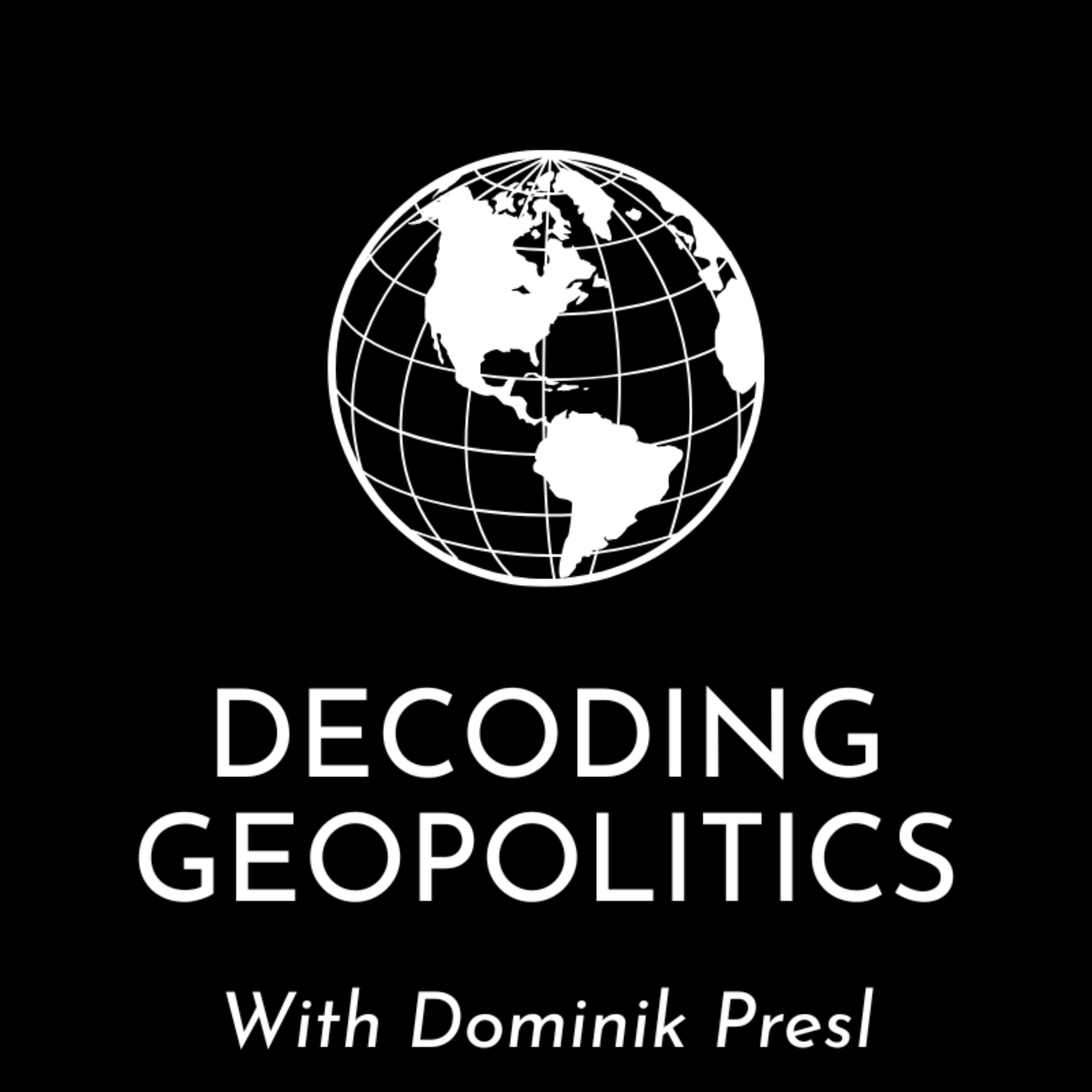

Decoding Geopolitics Podcast with Dominik Presl
Decoding Geopolitics
Decoding Geopolitics is a podcast that tries to make sense of today's dangerous world by talking with real experts on international relations, strategy and security.
Episodes
Mentioned books

Aug 17, 2025 • 39min
#78 Greg Smith: Rise and Fall of Nations - How Superintelligence Will Reshape Geopolitics
In this enlightening conversation, Gregory Smith, a policy analyst at RAND, dives into how artificial general intelligence (AGI) could transform global geopolitics. He discusses eight scenarios that illustrate the potential rise and fall of nations driven by AI advancements. The implications for international relations, including the possibility of a new Cold War between superpowers, are staggering. Smith emphasizes the urgent need to understand these shifts to prepare for a fundamentally different world order.

Aug 8, 2025 • 35min
#77 Anne Applebaum: What Putin Really Wants & How Ukraine War Will End
In this discussion with Anne Applebaum, a renowned historian specializing in Russia and Eastern Europe, the complexities of the Russia-Ukraine conflict are dissected. She highlights what truly drives Putin and his unexpected decisions, including rejecting a deal from Trump. The conversation shifts to U.S. foreign policy shifts and their implications for NATO relations. Applebaum also explores changing American views towards both Russia and Europe, discussing the rise of pro-Russian sentiments and the challenges they present for democracy and international alliances.

Aug 2, 2025 • 34min
#76 Jakub Jajcay: NATO Soldier Who Fought in Ukraine on Why This War Isn’t What You Think
Jakub Jajcay, a former officer in the Slovak military and volunteer in the Ukrainian military, shares his gripping experiences on the frontlines of the Ukraine conflict. He uncovers the stark contrast between media portrayals and the chaotic reality of war. Jakub critiques the perception of FPV drones, discusses the true capabilities of both the Ukrainian and Russian militaries, and explains why the anticipated counter-offensive in 2023 faltered. His unique insights offer a fascinating glimpse into the evolving nature of modern warfare and vital lessons for NATO.

Jul 27, 2025 • 50min
#75 John Dotson: Why Taiwan Is Preparing for the Wrong Kind of War
John Dotson, Director of the Global Taiwan Initiative and a former U.S. Navy officer, shares his insights on Taiwan's unique defense strategies. He discusses the gap between local perceptions of threats and U.S. concerns, revealing why many Taiwanese feel less anxious about a potential conflict with China. Dotson highlights Taiwan's focus on innovative tactics, such as gray zone operations, and emphasizes learning from military strategies used in other regions. The conversation also critiques Taiwan's military training and the challenges of adapting to evolving security threats.

Jul 23, 2025 • 33min
#74 Ali Ansari: Iran Is Collapsing from Within: This Is What Comes Next
Ali Ansari, a Professor and founding director of the Institute for Iranian Studies at the University of St Andrews, shares deep insights into Iran's turbulent political landscape. He discusses the transformational impact of recent conflicts on Iranian society, revealing growing disillusionment with the regime. Ansari analyzes the complexities of decision-making within the Iranian government and the vulnerabilities in its military strategy. He foresees a potential shift in Iran’s nuclear ambitions and a looming change in governance, suggesting profound consequences for the future.

Jul 19, 2025 • 33min
#73 Szabolcs Panyi: Why Viktor Orban's Era Is Coming To An End
In this engaging conversation, Szabolcs Panyi, a Hungarian investigative journalist, delves into the shifting political landscape as Viktor Orban faces a formidable challenger ahead of the upcoming elections. Panyi highlights recent scandals shaking Orban's government, including a controversial pardon and the resignation of key officials. The discussion also explores how the new opposition leader, Peter Magyar, is capitalizing on public discontent, and what potential changes in Hungary could mean for broader European politics.

Jul 14, 2025 • 44min
#72 Fabian Hoffmann: "Russia Is Stockpiling Missiles For War With NATO. Europe Is Shockingly Unprepared"
Fabian Hoffmann, a Doctoral Research Fellow at the University of Oslo, dives into the unsettling topic of missile warfare. He highlights Russia's significant missile stockpiling in anticipation of a potential NATO conflict, raising alarms about Europe's unpreparedness. Hoffmann discusses the efficacy of Israel's Iron Dome and critiques Europe's air defense policies as fundamentally flawed. He also emphasizes the need for a strategic reassessment in light of Russia's growing capabilities and Ukraine's ongoing struggles against escalating threats.

Jul 8, 2025 • 34min
#71 Sir Lawrence Freedman: How the War in Ukraine Will End
Sir Lawrence Freedman, a renowned British historian and strategist, offers insights into the current geopolitical landscape. He analyzes the recent conflict between Israel and Iran, questioning the success of U.S. involvement. Freedman delves into the challenges faced by Russia in the Ukraine war, emphasizing the difficulty of finding a resolution and the implications of continued stalemate. He argues that the future of warfare may not rely as heavily on drones as often thought, providing a fresh perspective on evolving military strategies.

4 snips
Jul 5, 2025 • 14min
Intelligence Brief: So, Has the Iran-Israel War Actually Achieved Anything?
The discussion kicks off with probing the motivations behind the Israel-Iran conflict, especially around nuclear capabilities. It highlights the contrasting strategies of the U.S. and Israel, focusing on their differing stances on military involvement. The podcast also evaluates Iran's military vulnerabilities and strategic choices in a complex regional landscape. Lastly, it delves into Iran's nuclear strategy, exploring its geopolitical implications and the delicate balance between deterrence and negotiation.

Jul 3, 2025 • 12min
Most Replayed Moment: Sarah Paine - What Is China's Grand Strategy?
Watch the full episode: https://open.spotify.com/episode/4vQiQmqq38Ymia0LYZiAzs?si=qkL_PYGkTvSYzVz98wZTNw➡️ Sign up to my free geopolitics newsletter: https://stationzero.substack.com/Sarah Paine discussess what is actually China's Grand Strategy - and what it means for the rest of the world.


